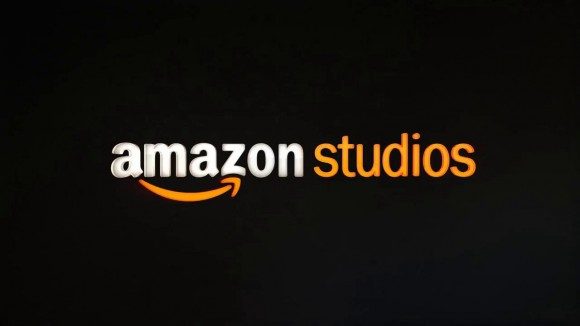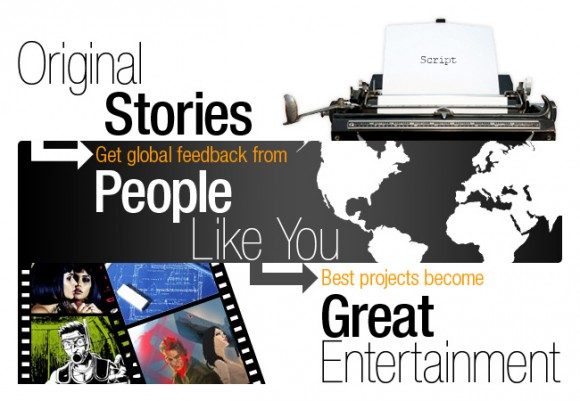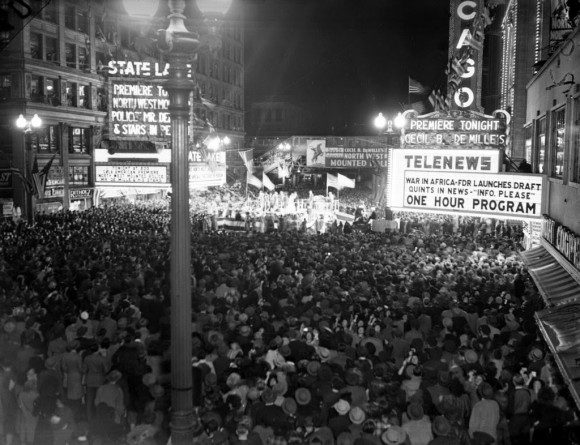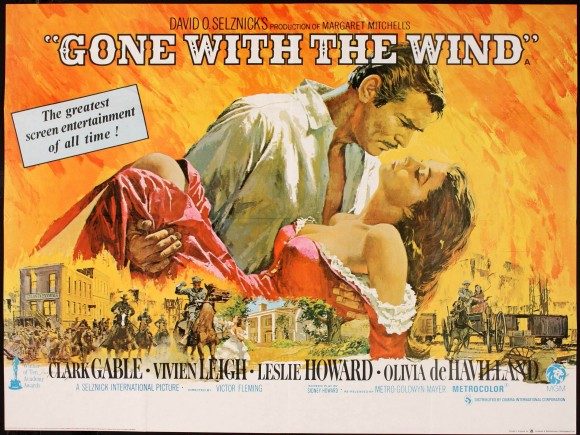So this has been a good year for Amazon so far, hasn’t it? First its flagship series Transparent ends up being the belle of the ball at the Golden Globes. Then it announces the development of a new original TV series with Woody Allen. Last week it dropped the news that it would become a full-fledged movie studio, producing and distributing feature films at a theatrical level. If they keep up this pace by December they’ll be announcing their complete ownership over the state of California and their exclusive filmmaking contract with the reanimated corpse of Alfred Hitchcock.
In case this particular piece of news has slipped past you, Amazon Studios, established in 2010 as the media production wing of the ever-expanding e-commerce juggernaut, recently announced its plans to begin producing films and releasing them theatrically. The company had attracted some attention with its initial volley of mostly well-received TV series (released via online streaming in the Netflix model) and its open submission policy for original material, but this news has caught people’s attention. The current plans for the studio are to release about a dozen originally produced films theatrically every year, with these then being made available through the Amazon Prime streaming service a short time (four to eight weeks are the figures currently being bandied about) after their theatrical run. The company has appointed producer Ted Hope (the man behind the production of films like 21 Grams, American Splendor, and Happiness) as the head of their creative department and, indirectly, as the executive officer of this operation.
Welcome to Amazon @TedHope Let’s make some great movies pic.twitter.com/4D9XjiHeWA
— Roy Price (@RoyPrice) January 19, 2015
Now, I’m not much for doomsaying in the wake of these sorts of developments. I tend to believe that, at least as far as the consumer is concerned, the buffet-style, laissez-faire modes of consumption are the most beneficial. If companies want to speed up the rate at which films are available in formats other than theatrical release, I fail to see how that’s anything other than a plus for the audience. In broad strokes, anything that reduces the amount of time and inconvenience that audiences have to go through before being able to watch a film the way they want to goes down as a good thing in my book, while things that keep us arbitrarily shackled to models of distribution that were designed to fit the needs of decades-old market realities goes down as a bad thing. And I’m sorry, movie theater chains, but facing stuff like this head on is the only way you’re going to find the evolutionary leap that’s going to keep you relevant in this new market. So, no, this sort of thing is not a step towards some kind of cinematic apocalypse, online streaming services are not the devil, and movies are still going to be movies well after the dust settles on these matters.
With that said, there are a few things about this article that do merit a few raised eyebrows. The announcement from Amazon and much of the ensuing press coverage has placed a very strong emphasis on a few key aspects of this enterprise. They’ve been taking care to highlight the speed with which their original films will be available, exclusively, through their subscription service, Prime Instant Video. And they have been promising that their studio is going to known for making a very particular kind of film, fresh and daring, and for giving filmmakers the chance to put together exciting and unique stories.
There may well be philosophical inclinations for Amazon’s leadership to be taking this stance, but there’s also a very strong economic reason for it. Their future films’ theatrical release might be seen as a sign of legitimacy and an extra source of revenue, but the company seems to be putting its weight behind their product’s continuing life as part of its exclusive subscription catalogue. The sell seems to be heavily weighted towards, “You’re going to be able to get all of these great theatrically released films on our streaming service so quickly.” (Netflix has an even more efficient, highly criticized system in the works.) And what this does is massively change the way the production company looks at its investments and their returns. In a traditional model, you want each of your films to be seen by as many people as possible. In this model, all you need is to get people subscribed, so it’s not as critical for all your films to be four-quadrant crowd pleasers. If your first film of the year is Avatar and half the world subscribes to your system to see it, you have a bit more leeway with what you do with the other eleven films for that calendar.
That’s the shift that this announcement seems to be heralding, and it’s the reason that the company can afford to be taking on the unique and bold films it’s allegedly so eager to make. Think of it this way: it’s a lot more comforting to bet on long shots if only one of them has to hit the mark to make sure your base of subscribers re-ups each year – and if you can have one sure fire thing under your belt and any profit from the long shots is just extra gravy, well, that’s even better. Part of the reason why HBO and other premium cable channels were able to reenergize original television programs in the late nineties was their use of a similar economic system. The truth, however, is that this isn’t really a new idea for the world of film. In fact, this used to be the way that all of Hollywood worked. Back in the day, they called it block booking.
Block booking was one of the charming practices that various studio systems employed in the first half of the 20th Century to, basically, run their businesses as a monopoly. The core idea is that rather than selling individual films to independent movie theaters, studios would sell their output in all-or-nothing “blocks,” effectively meaning that if theaters wanted to get their hands on the big-budget, star studded, must-have mega productions they would have to take whatever else the producing studio had on their slate for the season. “What’s that, AMC? You want to show The Wizard of Oz? Sure thing – as long as you play three of our B-movies a week for the next 42 weeks.” Translated into modern terms, imagine if you only got to play Guardians of the Galaxy if you agreed to play three That Awkward Moments each week for the entire year.
It’s an insidious system, and it worked like gangbusters. Block booking basically meant that film studios operated at almost no financial costs for almost all of the thirties and forties. The package deals they used rented their flagship titles for a percentage of the profits but pawned off the majority of their catalogue at flat rates, thus minimizing their risks and maximizing their profits. Effectively, as long as each studio retained a few A-list superstars, made at least one event picture too good to resist a year, and kept all of their B-movies below a certain cost, they could operate with almost guaranteed profits, shifting all the financial risk to the theaters. This practice also had the added benefit of muscling out any competition from up-and-coming studios that weren’t already an established player. Even if you made the 1942 equivalent of Little Miss Sunshine you probably wouldn’t be able to get it seen, since all of the screens were tied up showing the various films studios foisted on the independent distributors. Ever wonder why you don’t really hear about indie films before a certain point in film history? This is why.
I would love to be able to tell you that, since the studios were operating from a place of financial invulnerability, they took the chance to make some creatively bold, experimental films. I mean, as long as you’re not going to lose money either way, you may as well run a filmmaking laboratory, trying out new narrative ideas and formal techniques so that you can stay on the cutting edge, right? Yeah, that’s not what happened. Instead, film studios used the invulnerability that block booking gave them as an excuse to basically toss out the quality control department for the majority of their creative output. The B-films of this period were cranked out at inhuman speeds and with how-low-can-you-go budgets, and as long as it was at least 60 minutes long and kinda looked like a movie, out it went. After all, since it’s already guaranteed distribution and profit, why bother with anything else? If you ever want to feel better about how crass/materialistic modern day Hollywood is, check out some of the dreck that was made during this period.
Why did block booking end? Basically because of how massively illegal it was. A 1948 decision by the Supreme Court basically ruled that block booking (and a few other practices commonly employed by film studios) were in violation of various anti-monopolistic laws that existed in the United States, and the system was dismantled in a hurry. Productions had to be overhauled, distribution completely rethought-out, and both the number of produced films and the studios’ profits plummeted. This decision, along with the advent of television, ushered in a major paradigm shift in the filmmaking business, one that pushed us towards the beginnings of the system that has been dominant for the past few decades.
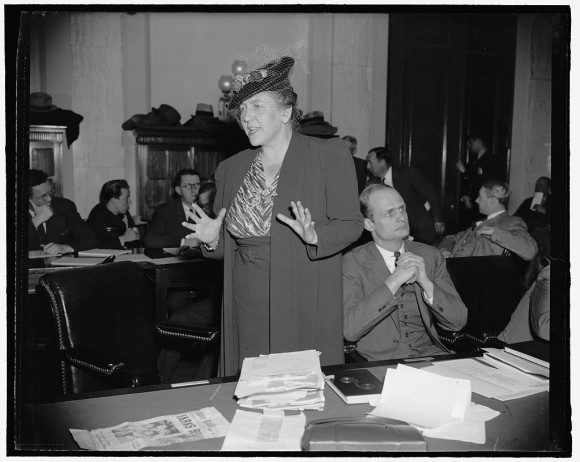

Katherine Van Etten Lexford, Executive Secretary of the Massachusetts Civic League, was one of the early advocates of prohibiting block booking and similar practices.
Now, I don’t want to overstate the similarities between the old school block booking model and the subscription system that Amazon Studios is gunning for, but… well, some bells are ringing. They’re both systems that revolve around the same things: people buying wholesale into a whole lot of product rather than being able to individually buy the parts they’re interested in, and the freedom that this gives the filmmaking studios. Amazon Studio’s system just cuts out the middleman and moves the subscription from the theater directly to the audience. There are also a few other alarming similarities between that situation and the reality that we’re living. Another one of the practices that government nixed in the 1948 decision was the custom of studios owning theaters and distribution systems directly, something that we’re now seeing a weird inverse form of with Netflix and Amazon Studios.
But we shouldn’t approach this from a place of absolute cynicism, either. In fact, there are a lot of reasons to think that Amazon will not use their powers for evil. The appointment of Ted Hope is an extremely positive sign. This is a man who has been a longtime champion for independent films and artistic projects that are off the beaten path. The man who got Todd Solodonz’s Happiness seen feels like the last person who would create an assembly line for fast food filmmaking. But remember – what Hope is building for Amazon Studios is a system, not an ideology. We might see a great period of creativity and boldness under Hope, but what happens one year after he leaves the post?
Amazon Studios’ subscription system, just like the old Studio Era’s block booking practices, is not a tool of inherent good or inherent evil. They are just ways of doing business, models that are radically different from the dominant trends that we’ve had for a long time. It is exciting to get something that could radically shake up the system and give us new options in how we consume film. It’s just important to recognize that we have had a system like this in the past, and to remember that when we did, it was allowed to turn into a greedy, money-mongering monster that was hugely detrimental to film-going audiences. The first of Amazon Studios’ feature films should be released by the end of this year. If nothing else, it will be fascinating to see how this bold reimagining of an old Hollywood standard fares against the conventions that we’ve been living with for so long.

